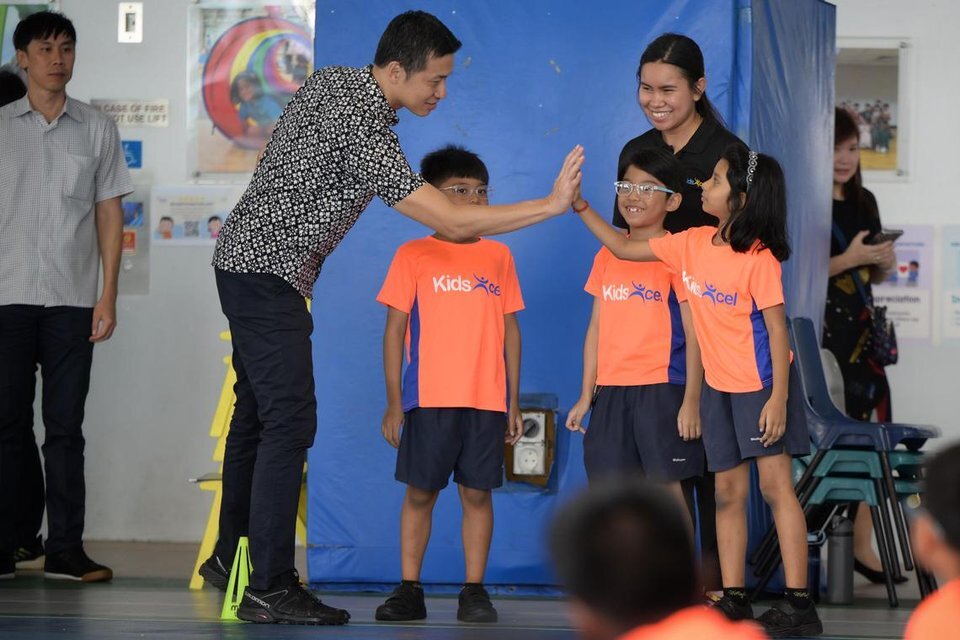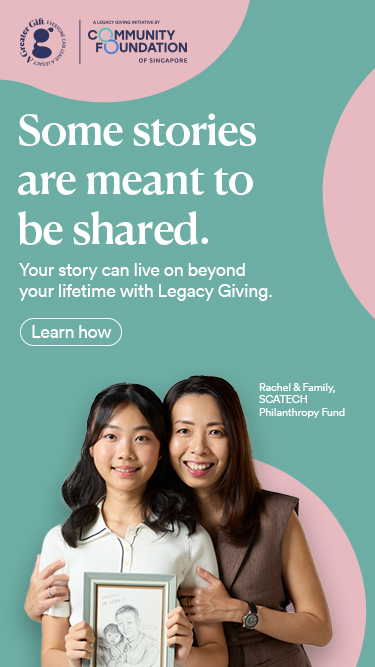Beyond cultural philanthropy: The art of making a difference


Last month’s Patron of the Arts event was a spot of sunlight at a time of gloomy Covid-19 headlines. The fact that Singaporeans – individuals as well as corporations – are still strongly supporting our arts groups in cash donations as well as with in-kind gifts was a heartening takeaway for everyone who cares for the arts and cultural scene in our country.
The annual awards – alongside a similar counterpart in the heritage sector – are a meaningful way to thank those who have been generous to the cultural landscape. And I am sure patrons also enjoy being in the limelight for an evening and being recognised for the vital support that they give to Singapore’s culture.
Cultural philanthropy is important for sustainability in the sector as it complements the grants given by the Government and the income that groups earn from ticket sales, classes and other programming.
However, while awards may recognise more significant donors, in reality, everyone can play a part, and arts companies appreciate all contributions, big or small. The income tax deduction also serves as an added incentive.
But beyond philanthropic giving, there are numerous other ways Singaporeans support the cultural scene. For starters, there are the skilled but unpaid volunteers who help out in many arts companies, serving on the board or on one of the committees. Today, with many arts companies being charities and some even Institutions of Public Character, which can collect tax-exempt donations, the boards have the important role of ensuring compliance with the latest codes of governance.
Fortunately, many of our leading arts companies have volunteers from the corporate world, including bankers, lawyers and accountants, who can contribute their expertise and ensure companies are well run, with funds from donors and grant-givers accounted for.
Sometimes, where necessary, they even mediate the relationship between the artistic team and company’s administrators who manage the purse strings.
Supporting artists’ works
It is also important to remember philanthropic giving typically benefits these arts charities. So any largesse may not benefit the freelance musicians, creative writers and visual artists, unless they receive commissions from the companies.
That is why there is another kind of patron who should be recognised. These patrons visit the artists’ studios, check what they are working on, and acquire or commission new works as a show of support. This is not philanthropy that attracts tax deductions, but such patrons have been instrumental in sustaining the careers of the visual artists, especially in the early days of their practice.
One sterling example of how one individual can make a difference is architect, art collector and former chairman of the National Gallery Singapore Koh Seow Chuan. His support of, and genuine interest in, Singaporean artists from pioneer painters like Cheong Soo Pieng to young contemporary artists, is well known and documented in Singapore’s art history. Singapore needs more committed patrons like Mr Koh.
Corporations, too, can give work to home-grown artists through active commissioning. For example, Raffles Hotel, as part of its reopening earlier this year, commissioned a playwright and theatre practitioners to create a virtual whodunnit set on the hotel’s beautiful grounds.
Co-owning the arts
But why is giving to the arts important in the first place? Why can’t the Government just fund and take care of everything? Well, that is because the arts should be co-owned by the people, even if there is strong government support. This model also ensures a diversity of artistic expressions and encourages more ground-up creations.
For individuals who step up and offer their time, energy and financial wherewithal, I suggest that they are driven by a deeper desire beyond a personal love for an art form. They clearly understand that art created from the community has something unique to say about the world we live in, conveyed through an artist’s sense of aesthetics or personal philosophy.
Such individuals also appreciate how the arts can inspire, restore weary spirits, and bring joy to people. Thus, by enabling artists or arts groups, these engaged individuals enrich the larger community and by extension, the nation.
For those with both ambition and resources, individuals have even galvanised like-minded people with diverse skills to start an arts company. Two relatively new organisations that have made significant strides in recent years are the Jazz Association, which develops and promotes home-grown jazz talents, and Re:Sound Collective, which programmes excellent chamber music for classical music lovers.
This is the spirit we need to harness in the Singapore of tomorrow. Certainly, the Government has signalled that it welcomes more partnerships with the private and people sectors, and no doubt, it has the resources to enable growth. This, of course, means a joint ownership of the arts and the attendant challenges in artistic excellence and audience development.
For those with the interest, skills or financial means but have no idea how to navigate and support the cultural scene, here are some practical suggestions.
The National Volunteer And Philanthropy Centre provides a service that matches skilled volunteers with leadership roles in non-profit organisations, including arts companies. First-timers can always start with event-based volunteerism, or by serving on a sub-committee, before offering to contribute on a board.
For those with more substantial financial means, they can approach the Community Foundation of Singapore (CFS), which can advise them on how to start a fund to support the cultural scene.
The CFS has helped donors set up charitable trusts with an interest in giving to the arts, among other priorities, on a sustained basis. In particular, newly settled entrepreneurs or business owners from overseas could consider this both to support and better understand the Singaporean cultural fabric.
One area Singapore can do better is in how the Government and an active citizenry can jointly identify the gaps in specific sectors, and establish ways to work together on solutions and co-deliver the outcomes. The Government should not be expected to have its finger on the pulse of every part of society, and indeed may not also be in the best place to respond to every challenge.
Timely questions
For the arts, this is a timely question as the National Arts Council takes stock of its first five-year arts master plan and looks ahead to its next.
Should grooming pop music talent for export or developing community arts for positive social outcomes be a priority? What about adapting our home-grown literature across multimedia or facilitating more translations? And importantly, how can the people sector jointly own these priority areas?
The approach here applies to other parts of society as well – from the social sector to sports and the environment. A trusting partnership between the Government and committed citizens will lead to Singaporeans proactively owning challenges and gaps in specific sectors, encourage experimentation on new approaches while providing greater clarity to private funders and skilled volunteers on where to focus their energies.
Successful partnerships will also reduce duplication and inefficiencies, such as having too many parties with similar missions or chasing after the same demographic to provide services.
As existing non-profit companies make an objective assessment of their future and relevance to their stakeholders, government agencies will also need to reflect on how much more space they can cede to support the growth of the people sector to achieve such strong partnerships.
This will be critical for a resilient citizenry, as society matures and the people continue to grapple with the pernicious impact of a protracted pandemic.
- Paul Tan is the former deputy chief executive of the National Arts Council and serves on a few boards of non-profit arts companies in Singapore.
If you would like to start your journey of effective giving, visit here.
This article was originally published in The Straits Times here. Source: The Straits Times © Singapore Press Holdings Limited. Permission required for reproduction.
Last month’s Patron of the Arts event was a spot of sunlight at a time of gloomy Covid-19 headlines. The fact that Singaporeans – individuals as well as corporations – are still strongly supporting our arts groups in cash donations as well as with in-kind gifts was a heartening takeaway for everyone who cares for the arts and cultural scene in our country.
The annual awards – alongside a similar counterpart in the heritage sector – are a meaningful way to thank those who have been generous to the cultural landscape. And I am sure patrons also enjoy being in the limelight for an evening and being recognised for the vital support that they give to Singapore’s culture.
Cultural philanthropy is important for sustainability in the sector as it complements the grants given by the Government and the income that groups earn from ticket sales, classes and other programming.
However, while awards may recognise more significant donors, in reality, everyone can play a part, and arts companies appreciate all contributions, big or small. The income tax deduction also serves as an added incentive.
But beyond philanthropic giving, there are numerous other ways Singaporeans support the cultural scene. For starters, there are the skilled but unpaid volunteers who help out in many arts companies, serving on the board or on one of the committees. Today, with many arts companies being charities and some even Institutions of Public Character, which can collect tax-exempt donations, the boards have the important role of ensuring compliance with the latest codes of governance.
Fortunately, many of our leading arts companies have volunteers from the corporate world, including bankers, lawyers and accountants, who can contribute their expertise and ensure companies are well run, with funds from donors and grant-givers accounted for.
Sometimes, where necessary, they even mediate the relationship between the artistic team and company’s administrators who manage the purse strings.
Supporting artists’ works
It is also important to remember philanthropic giving typically benefits these arts charities. So any largesse may not benefit the freelance musicians, creative writers and visual artists, unless they receive commissions from the companies.
That is why there is another kind of patron who should be recognised. These patrons visit the artists’ studios, check what they are working on, and acquire or commission new works as a show of support. This is not philanthropy that attracts tax deductions, but such patrons have been instrumental in sustaining the careers of the visual artists, especially in the early days of their practice.
One sterling example of how one individual can make a difference is architect, art collector and former chairman of the National Gallery Singapore Koh Seow Chuan. His support of, and genuine interest in, Singaporean artists from pioneer painters like Cheong Soo Pieng to young contemporary artists, is well known and documented in Singapore’s art history. Singapore needs more committed patrons like Mr Koh.
Corporations, too, can give work to home-grown artists through active commissioning. For example, Raffles Hotel, as part of its reopening earlier this year, commissioned a playwright and theatre practitioners to create a virtual whodunnit set on the hotel’s beautiful grounds.
Co-owning the arts
But why is giving to the arts important in the first place? Why can’t the Government just fund and take care of everything? Well, that is because the arts should be co-owned by the people, even if there is strong government support. This model also ensures a diversity of artistic expressions and encourages more ground-up creations.
For individuals who step up and offer their time, energy and financial wherewithal, I suggest that they are driven by a deeper desire beyond a personal love for an art form. They clearly understand that art created from the community has something unique to say about the world we live in, conveyed through an artist’s sense of aesthetics or personal philosophy.
Such individuals also appreciate how the arts can inspire, restore weary spirits, and bring joy to people. Thus, by enabling artists or arts groups, these engaged individuals enrich the larger community and by extension, the nation.
For those with both ambition and resources, individuals have even galvanised like-minded people with diverse skills to start an arts company. Two relatively new organisations that have made significant strides in recent years are the Jazz Association, which develops and promotes home-grown jazz talents, and Re:Sound Collective, which programmes excellent chamber music for classical music lovers.
This is the spirit we need to harness in the Singapore of tomorrow. Certainly, the Government has signalled that it welcomes more partnerships with the private and people sectors, and no doubt, it has the resources to enable growth. This, of course, means a joint ownership of the arts and the attendant challenges in artistic excellence and audience development.
For those with the interest, skills or financial means but have no idea how to navigate and support the cultural scene, here are some practical suggestions.
The National Volunteer And Philanthropy Centre provides a service that matches skilled volunteers with leadership roles in non-profit organisations, including arts companies. First-timers can always start with event-based volunteerism, or by serving on a sub-committee, before offering to contribute on a board.
For those with more substantial financial means, they can approach the Community Foundation of Singapore (CFS), which can advise them on how to start a fund to support the cultural scene.
The CFS has helped donors set up charitable trusts with an interest in giving to the arts, among other priorities, on a sustained basis. In particular, newly settled entrepreneurs or business owners from overseas could consider this both to support and better understand the Singaporean cultural fabric.
One area Singapore can do better is in how the Government and an active citizenry can jointly identify the gaps in specific sectors, and establish ways to work together on solutions and co-deliver the outcomes. The Government should not be expected to have its finger on the pulse of every part of society, and indeed may not also be in the best place to respond to every challenge.
Timely questions
For the arts, this is a timely question as the National Arts Council takes stock of its first five-year arts master plan and looks ahead to its next.
Should grooming pop music talent for export or developing community arts for positive social outcomes be a priority? What about adapting our home-grown literature across multimedia or facilitating more translations? And importantly, how can the people sector jointly own these priority areas?
The approach here applies to other parts of society as well – from the social sector to sports and the environment. A trusting partnership between the Government and committed citizens will lead to Singaporeans proactively owning challenges and gaps in specific sectors, encourage experimentation on new approaches while providing greater clarity to private funders and skilled volunteers on where to focus their energies.
Successful partnerships will also reduce duplication and inefficiencies, such as having too many parties with similar missions or chasing after the same demographic to provide services.
As existing non-profit companies make an objective assessment of their future and relevance to their stakeholders, government agencies will also need to reflect on how much more space they can cede to support the growth of the people sector to achieve such strong partnerships.
This will be critical for a resilient citizenry, as society matures and the people continue to grapple with the pernicious impact of a protracted pandemic.
- Paul Tan is the former deputy chief executive of the National Arts Council and serves on a few boards of non-profit arts companies in Singapore.
If you would like to start your journey of effective giving, visit here.
This article was originally published in The Straits Times here. Source: The Straits Times © Singapore Press Holdings Limited. Permission required for reproduction.
- Related Topics For You: ARTS & HERITAGE, CHARITY STORIES, DONOR STORIES, DONOR-ADVISED FUND, EVENTS, NEWS

.jpg)

